|
|
|
|
|
|
|
|
|
|
|
|
|
|
|
|
|
|
|
|
|
|
|
|
|
|
|
|
|
|
|
|
|
|
|
|
|
|
|
|
Menu |
|
|
|
|
|
|
|
|
|
|
|
|
|
|
|
|
|
|
|
|
|
|
|
|
|
|
|
|
|
|
|
|
|
|
|
|
|
|
Dasam
Pita Sri Guru Gobind Singh Ji - The Lord of the
White Falcon |
|
|
|
|
|
|
|
|
|
|
|
|
|
|
|
|
|
|
 |
|
|
|
|
|
|
|
|
|
|
|
|
|
|
|
|
|
|
|
|
|
|
 |
|
|
|
|
|
|
|
|
|
|
|
|
|
|
|
|
|
|
|
|
|
|
|
|
|
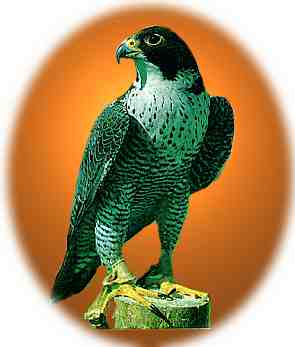 |
|
|
|
|
|
|
|
|
|
|
|
|
|
|
|
Guru
Gobind Singh, the tenth Guru, was born to Mata Gujri at Patna in 1666AD when
his father Guru Teg Bahadur was touring Bengal. Guru Gobind Singh lived at Patna
until he was five when he was taken to Anandpur. He was nine when Guru Tegh
Bahadur was martyred in Delhi. At that young age he inherited the responsibility
of guiding the Sikh faith and fulfilling the teachings of Guru Nanak. In the
midst of his engagements with the concerns of the community, he gave full attention
to the mastery of physical skills and literary accomplishment. |
|
|
|
|
|
|
|
|
|
The
moment child Gobind Rai was born in Patna, Pir Bhikan Shah of Thaska offered
his prayers facing East instead of towards West, contrary to his daily practice.
He left for Patna immediately. On arrival at the Guru residence, Pir placed
two bowl of milk and water before the divine child. The child Guru Gobind put
his hands on both the bowls, thus signifying: "The entire humanity is from
the same divine fountain: How can some be good and others evil? |
|
|
|
|
|
|
|
|
|
|
|
|
|
|
|
|
|
|
|
|
|
|
|
|
|
|
|
|
|
|
|
|
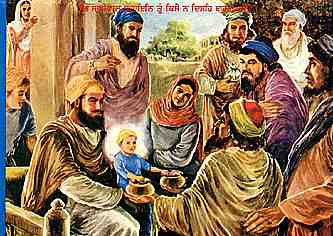 |
|
|
|
|
|
|
|
|
|
|
|
He had grown into a comely youth, spare, lithe of limp and energetic. As a result
of assiduous training and practice, the Guru gained unique facility in the use
of arms. He showed similar prowess at learning. Besides Punjabi, he gained proficiency
in Sanskrit, Braj and Persian. He had a natural genius for poetic composition.
He patronized poets, thinkers and scholars. In 1677 AD at the age of eleven,
Guru Gobind Singh was married to Mata Jito from whom he had three sons : Jujhar
Singh, Zorawar Singh, and Fateh Singh. The Guru had two other consorts: Mata
Sundri who joined in matrimony in 1684 AD and Mata Sahib Devan who was married
in 1700 AD. The former was the mother of Sahibzada Ajit Singh. |
|
|
|
|
|
|
|
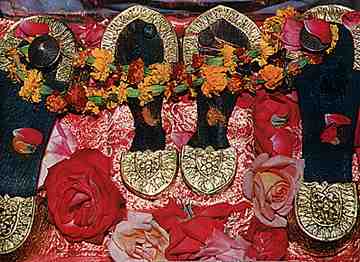 |
|
|
|
|
|
|
|
|
|
|
|
|
|
|
|
|
|
|
|
|
|
The
wooden sandals of Guru Gobind Singh Ji at his birth place Patna Sahib |
|
|
|
|
|
|
The
Guru was an example of a perfect saint--soldier. He had been cherishing the
idea that an effective armory should be developed. He had been able to build
a small but well-trained army. At the age of thirty-three years on the Baisakhi
Day of 1699 AD, he established the new order of the Khalsa and gave Sikhism
the present form. |
|
|
|
|
|
|
|
|
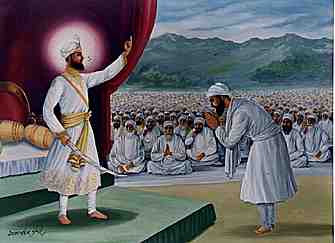 |
|
|
|
|
|
|
|
|
|
|
|
|
|
|
|
|
|
|
|
|
|
|
|
|
Guru
Gobind Singh Ji, at Fatehgarh Sahib asking for a head. Here he beheaded the
Five Piaras and with the 'Amrit', he again gave them life - "A new Life
- A new Spirit" infused into the dead concious of the Hindu Dharma. |
|
|
|
|
|
|
|
|
|
|
The
event, however, generated animosity in the hill chieftains who contacted the
Mughal forces to curb the Khalsa. The Guru had to fight many battles at Anandpur,
Charnkaur and Muktsar. His two elder sons: Ajit Singh and Jujhar Singh died
fighting at Chamkaur. The younger ones: Zorawar Singh and Fateh Singh were captured
by the ruler of Sirhind and were bricked alive. The Guru sacrificed his entire
family and underwent untold hardships for righteousness. |
|
|
|
|
|
|
|
|
|
|
Guru
Gobind Singh Ji shooting his deadly arrows at the battle of Chamkaur - where
40 Sikhs faced the mighty army of 100000 Mughal warriors. At the insistance
of the Sikhs Guru Ji escaped from this impossible fortification - which in history
is compared to a miracle. |
|
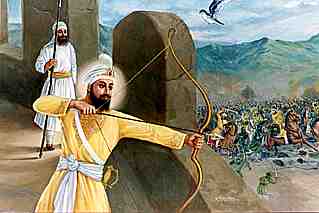 |
|
|
|
|
|
|
|
|
|
|
|
|
After
the death of Aurangzeb in February 1707 AD his successor Bahadur Shah made peace
with the Guru. The Guru also accompanied him on his expedition to Deccan. It
was during this travel that the Guru discovered Banda Bahadur. |
|
|
|
|
|
|
|
|
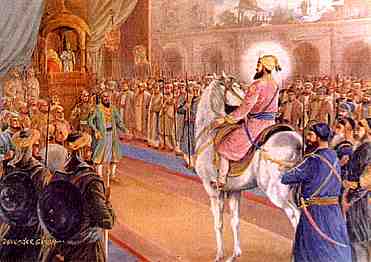 |
|
|
|
|
|
|
|
|
|
|
|
|
|
|
|
|
|
|
|
|
|
|
|
|
Guru
Gobind Singh Ji in the Durbar of Emperor Bahadur Shah-who cordially received
the Guru. |
|
|
|
|
|
Guru
Gobind Singh's work is best understood as the fulfillment of Guru Nanak's revelation.
The Sikh organization had taken on the semblance of a State during his days.
The Guru was a prolific writer. His writings are compiled in the form of the
Dasam Granth. |
|
|
|
|
|
|
|
|
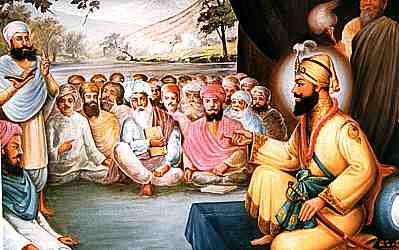 |
|
|
|
|
|
|
|
|
|
|
|
|
|
|
|
|
|
|
|
Guru
Ji had 52 poets in his Durbar, and regularly the Guru held poetical symposiums
and listened to his poets, and rewarded them generously. |
|
|
|
|
|
|
|
|
|
Guru
Gobind Singh Ji - a connosieur of music and a prolific singer, wanted even handicapped
to overcome their disabilities. He even taught several of blind disciples the
art of music and made them expert at instruments, such as Tabla, Rabab, Saranda
and Taus. The Guru bestowed his blessings on handicapped without discrimination. |
|
|
|
|
|
|
|
|
|
|
|
|
|
|
|
|
|
|
|
|
|
|
|
|
|
|
|
|
|
|
|
|
|
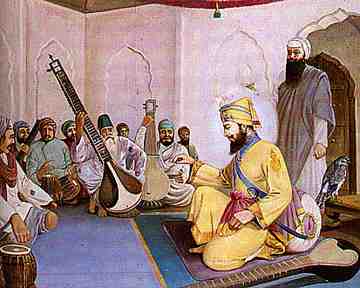 |
|
|
|
|
|
|
|
|
|
|
|
|
|
|
|
|
|
|
|
|
|
|
|
|
|
|
|
|
|
|
|
|
|
Next |
|
|
|
|
|
|
|
|
|
|
 |
 |
 |
 |
 |
 |
 |
 |
 |
 |
 |
 |
 |
 |
 |
 |
 |
 |
 |
 |
 |
 |
 |
 |
 |
 |
 |
 |
 |
 |
 |
 |
 |
 |
 |
 |
 |
 |
 |



















